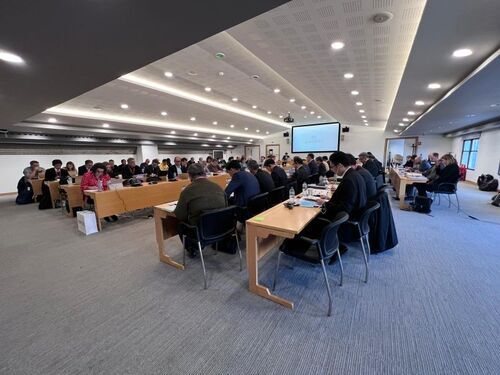ÐÎÑÑÈÉÑÊÈÉ ÏÐÎÔÅÑÑÈÎÍÀËÜÍÛÉ ÑÎÞÇ ÌÎÐßÊÎÂ
SEAFARERS' UNION OF RUSSIA
A NON-UNIONIZED SEAFARER
IS AN UNPROTECTED SEAFARER
Back
Seafarers’ unions and maritime employers agree pay boost under unique and world’s largest Collective Bargaining Agreement

Seafarers around the world will receive a two-year, 5% pay rise after negotiations at the International Bargaining Forum (IBF) in Singapore, in May.
The pay award will be implemented through 2 stages: a 3.5% pay rise with effect from 1 January 2026, and a further 1.5% pay rise with effect from 1 January 2027.
In addition to the pay rise, the social partners – seafarers unions and shipowners - agreed to increase the death and disability benefits by 5% also.
The International Bargaining Forum is a unique structure that generates terms and clauses for the world’s largest collective bargaining agreement. Thus, the IBF Framework CBA is a shipping industry's principal collective bargaining agreement, which covers more than 11,000 vessels under the flags of convenience and sets minimum wage and working conditions criteria for 400,000 seafarers.
The sides of this unique global agreement are maritime employers and seafarers unions from around the world. The core principle of IBF is to ensure a sustainable development of shipping industry and fair working and welfare conditions at sea for seafarers. Besides, the IBF Agreement plays a crucial role in setting employment standards across the industry.
Note that the negotiations in Singapore were tough as the increase in the cost of living over the past couple of years has been an acute problem for not only seafarers but also shipowners. As always, the outcome has involved give and take on social partners. The IBF participants discussed in good faith and tried to explore every avenue to reach an agreement that would be accepted by both sides.
Today it’s imperative that seafarers facing increases to their cost of living don’t face real terms pay cuts.
Besides, we can’t forget that crew members have faced some very tough times in recent years – from the pandemic to ongoing geopolitical conflicts.
Through all this, seafarers keep working hard and be on watch steadily. Doubtlessly, they deserve every cent of this pay rise.
We should add, there is a lot of work ahead. Seafarers' unions and shipowners will continue to discuss many important issues that affect the working and living conditions of the crews of ships covered by IBF agreements: among them - a fair transition to alternative fuels; retaining unique specialists and attracting new talent; ensuring that seafarers have the knowledge and skills they will need in their future work. These are the issues that have ingrained the international agenda firmly and permanently.
Reference: the IBF was established in 2003 as a mechanism for collective bargaining between maritime employers and unions to agree the wages and conditions of seafarers working aboard vessels flying the flags of convenience. The IBF includes both central negotiations and local negotiations which allow for development of core principles which can then be incorporated into specific arrangements. This unique approach is the only example of international collective bargaining on remuneration of labor in private sector.
Up
